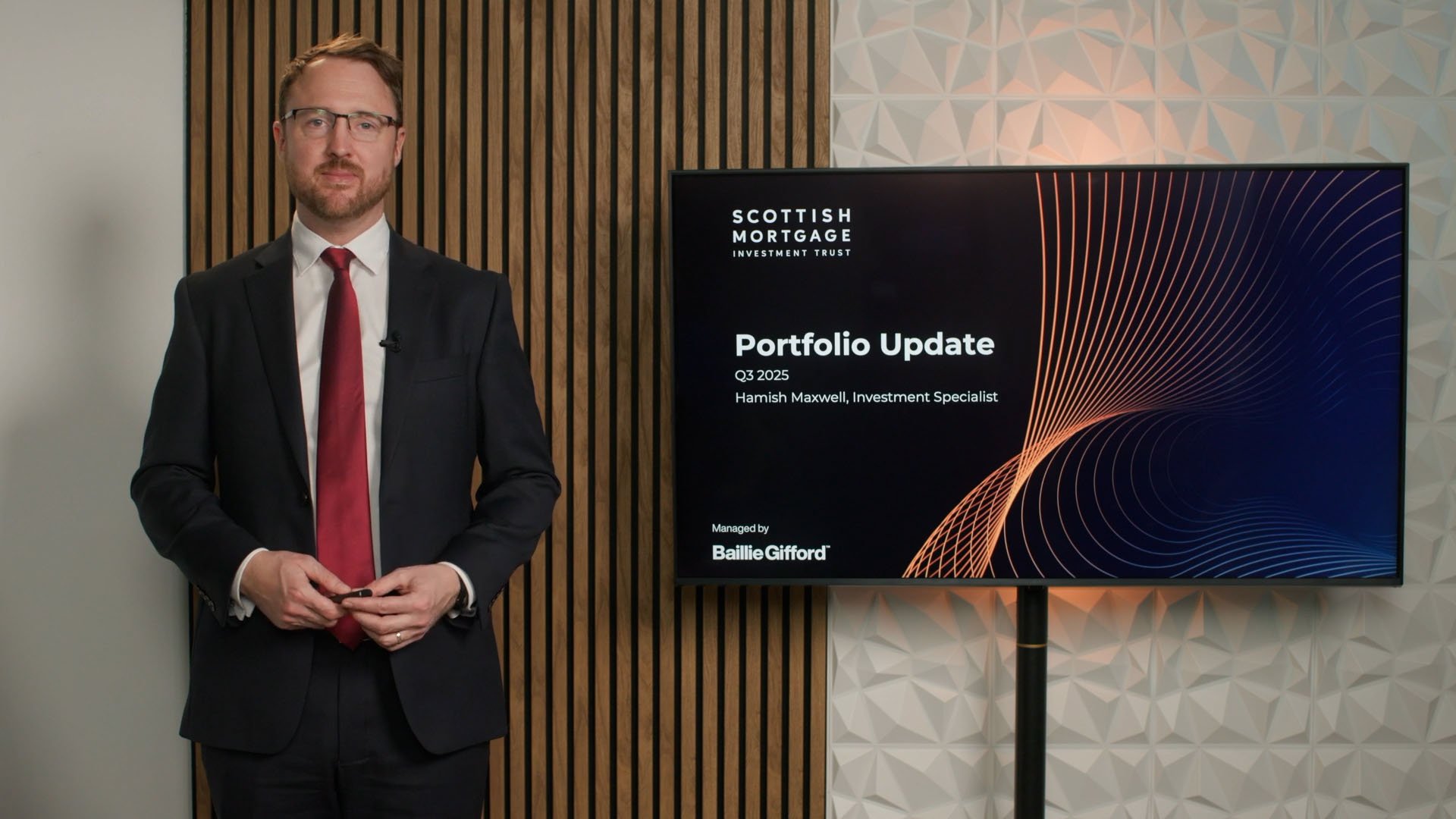Perspectives on Progress #2
Claire Shaw – Portfolio Director
Key points
- Moderna’s cancer vaccine and UPSIDE Food’s cultivated meat look less like science fiction and more like reality
- For Kering, Alessandro Michele’s departure opens the door for brand revival at the luxury fashion house, Gucci
- Can Zoom continue to zoom? Its annual user conference suggests it can

All investment strategies have the potential for profit and loss. Your or your clients’ capital may be at risk.
Upside Foods
Cultivated meat gets no questions letter from FDA
Writing an open letter to the chickens of the world – yes, you read that right! – UPSIDE Foods founder Uma Valeti thought they should be first to know, “they could be dismissed from the dinner table”. The ad, featured in The New York Times, marks UPSIDE becoming the first company in the world to receive a ‘No Questions’ letter for cultivated meat from the US Food and Drug Administration (FDA). It means the FDA has accepted the science behind UPSIDE’s production method and believes its cultivated meat is safe to eat.
Cultivated meat is not vegan, vegetarian or plant-based, it is real meat grown from animal cells in cultivators in a laboratory. This method eliminates the need to raise and slaughter millions of animals, thus avoiding the environmental impacts associated with animal agriculture.
Meat is a $1tn dollar industry. With demand for meat expected to double by 2050, cultivated meat has the potential to help satisfy the growing global demand while reducing the environmental impacts of our food system.
From here, the company will work with the USDA’s Food Safety and Inspection Service to secure the remaining approvals before its cultivated chicken can be sold to consumers.
Valeti noted that it was a “watershed moment” in the history of food, with this regulatory milestone marking a major step towards a new era in meat production. We are excited to be on this journey with Uma and the team!

Moderna
A game-changing vaccine for cancer?
“Better than my highest expectations” is how Moderna CEO Stephane Bancel described the phase two data from its mRNA vaccine for cancer. The experimental cancer vaccine, in combination with Merck’s immunotherapy drug Keytruda, reduced the risk of death or recurrence of melanoma in high-risk patients by 44 per cent compared with treatment using just Keytruda.
And Bancel thinks this should also work with other tumours.
The experimental vaccine uses mRNA to deliver a vaccine that teaches the immune system to specifically target cancer tumours.
Creating a personalised cancer vaccine starts in the clinic. You take tissue from the tumour, sequence it and then over a six-week period, Moderna manufactures a vaccine that matches the top 10/20 mutations.
We think this has the potential to be a new paradigm in the treatment of cancer patients. It endorses our view that Moderna is pioneering a new class of medicine based on mRNA and confirms it can broaden its offering beyond respiratory diseases.
Moderna and Merck plan to launch a phase three trial in 2023 and we are very excited to watch developments unfold.


Kering
Michele leaves the House of Gucci after 20 years
Gucci’s Creative Director, Alessandro Michele, has stepped down after eight years at the helm and more than twenty years at the illustrious fashion house. Starting as an accessories designer in 2002, he was relatively unknown outside Gucci when he was named creative director in 2015. While his appointment raised a few eyebrows at the time, Michele has played a fundamental part in making the brand what it is today. He has overseen one of the most successful periods in Gucci’s history, with sales more than doubling and profits tripling in his tenure.
Defining Michele’s Gucci aesthetic in a few words is impossible. Its mixture of adidas and North Face logos with renaissance-style frills and fabrics does not lend itself to an easy description – it was just simply ‘Gucci’. He has a distinct style that embodied wider cultural conversations around gender, sexual identity and race.
However, the pace of revenue growth at Gucci has been slowing, with some critics highlighting ‘fatigue’ around Michele’s designs as the reason why. Against that backdrop, Michele’s departure should come as no surprise. Unexpected and unsentimental changes at the top are not new at Kering.
The willingness to let creative directors experiment artistically is what makes Pinault’s management style and culture so unique and we look forward to seeing what the new chapter holds.
Zoom
The recipe may change, but Zoom’s secret sauce hasn’t
Hoovering, Xeroxing, Rollerblading, FedExing and Googling. Typically, a company name becomes a verb because of creeping industry dominance over a lengthy period. For videoconferencing, however, the rise of ‘Zooming’ materialised almost overnight during the pandemic.
Zoom’s revenue has grown more than tenfold over the past three years, with a commensurate explosion in its enterprise customer base – from less than 50,000 to over 200,000 enterprise users. But as the pandemic subsides, Act One is over for Zoom. Their growth trajectory will never see a repeat of 2020 and 2021.
So what will drive the company’s next leg of growth? Zoom’s product engineers have been busy building 1,500 new features and enhancements in the last year alone. To give a flavour, it has been:
- developing the ability for users to have multiple co-working spaces live on their screen
- considering how to replicate its services on the move: a partnership with Tesla enables video calls in the car
- and developing machine learning capabilities to seamlessly integrate different languages.
Just as Microsoft and Adobe continually add features and encourage users to move up the price curve, so too could Zoom. Safe to say the pipeline looks sufficiently compelling to make the post-pandemic air pocket worth riding out.


Carvana
Navigating tough times
Carvana’s mission is to change the way people buy cars through the online automotive dealership that it operates across the US. This is a trillion-dollar market, characterised by highly-fragmented, legacy car dealership networks with customer service that is often shoddy at best. Carvana’s near-term ambition is to sell 2 million of the 40 million used cars sold in the US and Canada each year. In the longer term, they could conceivably gain a much higher market share and our numerical scenario analysis implies the potential for over 20x upside.
That’s all well and good but there’s a significant near-term challenge for Carvana to overcome. Economic headwinds are muting Carvana’s growth in the context of a business model that was designed to have economics at higher levels of scale. We’ve been engaging extensively with Carvana’s management team on this front. They’ve made decent progress on making the cost structure leaner to reduce their losses but there’s material pressure on the company’s balance sheet.
Some other holdings have faced similar challenges in the past, but have managed to weather the storm. Our role at this juncture is to patiently support the management team - but with discipline and prudent monitoring.
The trust invests in overseas securities. Changes in the rates of exchange may also cause the value of your investment (and any income it may pay) to go down or up.
The trust has a significant investment in private companies. The trust’s risk could be increased as these assets may be more difficult to sell, so changes in their prices may be greater.
The trust invests in emerging markets where difficulties in dealing, settlement and custody could arise, resulting in a negative impact on the value of your investment.
About the author - Claire Shaw
Portfolio Director
Claire Shaw is a portfolio director and plays a prominent role in servicing Scottish Mortgage’s UK shareholder base. Before joining in 2019, she spent over a decade as a fund manager with a focus on managing European equity portfolios for a global client base. With a background in analysing companies and communicating investment ideas, Claire is also responsible for creating engaging content that makes the Scottish Mortgage portfolio accessible to all its shareholders. Beyond that, she works closely with the managers, meeting with portfolio companies and conducting in-depth portfolio discussions with shareholders.
Regulatory Information
This content was produced and approved at the time stated and may not have been updated subsequently. It represents views held at the time of production and may not reflect current thinking. Read our Legal and regulatory information for further details.
A Key Information Document is available by visiting our Documents page. Any images used in this content are for illustrative purposes only.
This content does not constitute, and is not subject to the protections afforded to, independent research. Baillie Gifford and its staff may have dealt in the investments concerned. The views expressed are not statements of fact and should not be considered as advice or a recommendation to buy, sell or hold a particular investment.
Baillie Gifford & Co and Baillie Gifford & Co Limited are authorised and regulated by the Financial Conduct Authority (FCA). The investment trusts managed by Baillie Gifford & Co Limited are listed on the London Stock Exchange and are not authorised or regulated by the FCA.
Baillie Gifford Asia (Hong Kong) Limited 柏基亞洲(香港)有限公司 (BGA) holds a Type 1 licence from the Securities and Futures Commission of Hong Kong to market and distribute Baillie Gifford’s range of collective investment schemes and closed-ended funds such as investment trusts to professional investors in Hong Kong.
Baillie Gifford Asia (Singapore) Private Limited (BGAS) is regulated by the Monetary Authority of Singapore as a holder of a capital markets services licence to conduct fund management activities for institutional investors and accredited investors in Singapore. BGA and BGAS are wholly owned subsidiaries of Baillie Gifford Overseas Limited, which is wholly owned by Baillie Gifford & Co.
Europe
Scottish Mortgage Investment Trust PLC (the “Company”) is an alternative investment fund for the purpose of Directive 2011/61/EU (the “AIFM Directive”). Baillie Gifford & Co Limited is the alternative investment fund manager (“AIFM”) of the Company and has been authorised for marketing to Professional Investors in this jurisdiction.
This content is made available by Baillie Gifford Investment Management (Europe) Limited (“BGE”), which has been engaged by the AIFM to carry out promotional activities relating to the Company. BGE is authorised by the Central Bank of Ireland as an AIFM under the AIFM Regulations and as a UCITS management company under the UCITS Regulation. BGE also has regulatory permissions to perform promotional, advisory and Individual Portfolio Management activities. BGE has passported its authorisations under the mechanisms set out in the AIFM Directive.
Belgium
The Company has not been and will not be registered with the Belgian Financial Services and Markets Authority (Autoriteit voor Financiële Diensten en Markten / Autorité des services et marchés financiers) (the FSMA) as a public foreign alternative collective investment scheme under Article 259 of the Belgian Law of 19 April 2014 on alternative collective investment institutions and their managers (the Law of 19 April 2014). The shares in the Company will be marketed in Belgium to professional investors within the meaning the Law of 19 April 2014 only. Any offering material relating to the offering has not been, and will not be, approved by the FSMA pursuant to the Belgian laws and regulations applicable to the public offering of securities. Accordingly, this offering as well as any documents and materials relating to the offering may not be advertised, offered or distributed in any other way, directly or indirectly, to any other person located and/or resident in Belgium other than to professional investors within the meaning the Law of 19 April 2014 and in circumstances which do not constitute an offer to the public pursuant to the Law of 19 April 2014. The shares offered by the Company shall not, whether directly or indirectly, be marketed, offered, sold, transferred or delivered in Belgium to any individual or legal entity other than to professional investors within the meaning the Law of 19 April 2014 or than to investors having a minimum investment of at least EUR 250,000 per investor.
Germany
The Trust has not offered or placed and will not offer or place or sell, directly or indirectly, units/shares to retail investors or semi-professional investors in Germany, i.e. investors which do not qualify as professional investors as defined in sec. 1 (19) no. 32 German Investment Code (Kapitalanlagegesetzbuch – KAGB) and has not distributed and will not distribute or cause to be distributed to such retail or semi-professional investor in Germany, this document or any other offering material relating to the units/shares of the Trust and that such offers, placements, sales and distributions have been and will be made in Germany only to professional investors within the meaning of sec. 1 (19) no. 32 German Investment Code (Kapitalanlagegesetzbuch – KAGB).
Luxembourg
Units/shares/interests of the Trust may only be offered or sold in the Grand Duchy of Luxembourg (Luxembourg) to professional investors within the meaning of Luxembourg act by the act of 12 July 2013 on alternative investment fund managers (the AIFM Act). This document does not constitute an offer, an invitation or a solicitation for any investment or subscription for the units/shares/interests of the Trust by retail investors in Luxembourg. Any person who is in possession of this document is hereby notified that no action has or will be taken that would allow a direct or indirect offering or placement of the units/shares/interests of the Trust to retail investors in Luxembourg.
Switzerland
The Trust has not been approved by the Swiss Financial Market Supervisory Authority (“FINMA”) for offering to non-qualified investors pursuant to Art. 120 para. 1 of the Swiss Federal Act on Collective Investment Schemes of 23 June 2006, as amended (“CISA”). Accordingly, the interests in the Trust may only be offered or advertised, and this document may only be made available, in Switzerland to qualified investors within the meaning of CISA. Investors in the Trust do not benefit from the specific investor protection provided by CISA and the supervision by the FINMA in connection with the approval for offering.
Singapore
This content has not been registered as a prospectus with the Monetary Authority of Singapore. Accordingly, this content and any other content or material in connection with the offer or sale, or invitation for subscription or purchase, of the Trust may not be circulated or distributed, nor may be offered or sold, or be made the subject of an invitation for subscription or purchase, whether directly or indirectly, to persons in Singapore other than (i) to an institutional investor (as defined in Section 4A of the Securities and Futures Act 2001, as modified or amended from time to time (SFA)) pursuant to Section 274 of the SFA, (ii) to a relevant person (as defined in Section 275(2) of the SFA) pursuant to Section 275(1), or any person pursuant to Section 275(1A), and in accordance with the conditions specified in Section 275 of the SFA, or (iii) otherwise pursuant to, and in accordance with the conditions of, any other applicable provision of the SFA.
Where the Trust is subscribed or purchased under Section 275 by a relevant person which is:
(a) a corporation (which is not an accredited investor (as defined in Section 4A of the SFA)) the sole business of which is to hold investments and the entire share capital of which is owned by one or more individuals, each of whom is an accredited investor; or
(b) a trust (where the trustee is not an accredited investor) whose sole purpose is to hold investments and each beneficiary of the trust is an individual who is an accredited investor, securities or securities-based derivatives contracts (each term as defined in Section 2(1) of the SFA) of that corporation or the beneficiaries’ rights and interest (howsoever described) in that trust shall not be transferred within six months after that corporation or that trust has acquired the securities pursuant to an offer made under Section 275 except:
(1) to an institutional investor or to a relevant person or to any person arising from an offer referred to in Section 275(1A) or Section 276(4)(c)(ii) of the SFA,
(2) where no consideration is or will be given for the transfer;
(3) where the transfer is by operation of law; or
(4) pursuant to Section 276(7) of the SFA or Regulation 37A of the Securities and Futures (Offers of Investments) (Securities and Securities-based Derivatives Contracts) Regulations 2018.





